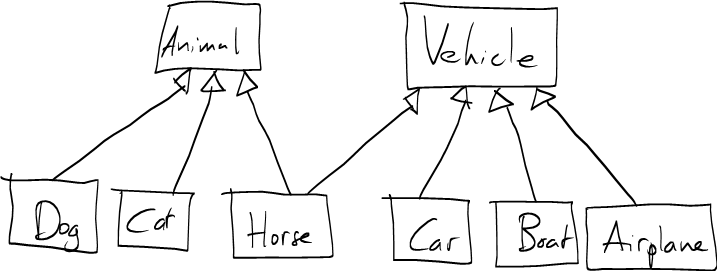Books / Fundamentals of Computer Science / Chapter 8
Type casts, instanceof, Object class, Interfaces
Instanceof, Type casts
Sometimes it is useful to find out whether a superclass reference points to an instance of a particular subclass. We can do so using the instanceof operator. For example:
public void startTrip(Vehicle v) {
if (v instanceof Airplane) {
// v points to an instance of Airplane
}Once we know for certain that a reference refers to an instance of a particular subclass, we can use a type cast to convert the reference to the subclass type. E.g.:
public void startTrip(Vehicle v) {
// Note: in general, this is not a good idea
if (v instanceof Airplane) {
Airplane a = (Airplane) v;
a.retractLandingGear();
}Both instanceof and type casts should be used sparingly, if at all. It is better object-oriented design to define common operations supported by all subclasses, and let the subclasses implement them appropriately, rather than sprinkling the code with instanceof checks leading to casts and calling subclass methods.
java.lang.Object
Every class in Java is a subclass of the class java.lang.Object. If you don’t specify a superclass when you define a class, it will be a direct subclass of java.lang.Object.
One reason that the Object class is useful is that it defines some methods that are useful for all objects. For example, the equals method:
public boolean equals(Object o) {
...This method can be called on an object to compare it for equality with another object:
public void someMethod(String s1, String s2) {
if (s1.equals(s2)) {
// s1 and s2 are identical
}
}Note that the equality operator (==) compares two references to see whether or not they point to the same object. Demonstration:
String s1, s2;
char[] a = { 'F', 'o', 'o', 'b', 'a', 'r' };
s1 = "Foobar";
s2 = "";
for (int i = 0; i < a.length; i++) {
s2 = s2 + a[i];
}
System.out.println(s1.equals(s2)); // prints "true"
System.out.println(s1 == s2); // prints "false"So: if you want to compare two objects to see if they have the same contents, use the equals method, not the equality operator.
You can define your own equals method in your own classes. It should look like this:
public class MyClass {
private int value;
...
public boolean equals(Object o) {
if (o == null || !(o instanceof MyClass)) {
return false;
}
MyClass other = (MyClass) o;
if (this.value == other.value) { // compare fields
return true;
} else {
return false;
}
}Another useful methods in java.lang.Object is toString (convert an object into a string).
Another reason why the Object class is useful is that it can be used as a generic type: we will explore this idea further in the next chapter.
Interfaces
An interface is a completely abstract class. It can define abstract methods, but cannot define fields or concrete methods.
When a class is a subclass of an interface, we say that the class implements the interface.
Interfaces are useful because, while a class may have only one superclass, it may implement any number of interfaces.
Example:
A Horse is both a Vehicle and an animal. It can support operations defined for vehicles—startTrip, move, endTrip—and can also support any operations defined for animals, such as numberOfLegs, makeSound, etc.
We can make this work in Java as long as either Vehicle or Animal is an interface. Since we have made Vehicle a class, we’ll make Animal an interface.
public interface Animal {
public int numberOfLegs();
public void makeSound();
}
public class Horse extends Vehicle implements Animal {
public Horse(double maxSpeed) {
super(maxSpeed);
}
public boolean startTrip(Terrain t) {
return canMove(t);
}
public boolean move(Terrain t) {
return canMove(t);
}
public boolean endTrip(Terrain t) {
return canMove(t);
}
private boolean canMove(Terrain t) {
// horses can go anywhere except water
return t != Terrain.WATER;
}
public double getSpeed(Terrain t) {
if (t == Terrain.FIELD) {
// half speed
return 0.5 * getMaxSpeed();
} else if (t == Terrain.MOUNTAIN) {
// quarter speed
return 0.25 * getMaxSpeed();
} else {
return getMaxSpeed();
}
}
public int numberOfLegs() {
return 4;
}
public void makeSound() {
System.out.println("Neigh");
}
}Comparable
Java defines a number of standard interfaces that you can have your own classes implement. One such interface is java.lang.Comparable. The Comparable interface looks something like this:
public interface Comparable {
public int compareTo(Object o);
}
The compareTo method is similar to the equals method defined in java.lang.Object, except that instead of comparing against another object to see if the objects are equal, compareTo compares against another object to see if it is less than, equal to, or greater than the instance on which compareTo is called. The return value indicates the result of the comparison:
- a negative value means that this object is less than the compared (parameter) object
- zero means the objects are equal
- a positive value means that this object is greater than the compared (parameter) object
This is useful to allow objects to be ranked against each other.
For example, the String class implements the Comparable interface. Its compareTo method compares string values using lexicographical comparison, which is a generalization of alphabetical order.
Implementing Comparable
Say we have an Employee class:
public class Employee {
private String lastName;
private String firstName;
private int salary;
...Let’s say we want to have Employee implement the Comparable interface. We must define how Employee objects are to be compared. We’ll choose that Employee objects are compared first by last name, then by first name, then by salary:
public int compareTo(Object o) {
Employee other = (Employee) o;
int cmp;
// compare last names
cmp = this.lastName.compareTo(other.lastName);
if (cmp != 0) {
return cmp;
}
// last names are the same - compare first names
cmp = this.firstName.compareTo(other.firstName);
if (cmp != 0) {
return cmp;
}
// last and first names are the same - compare salaries
if (this.salary < other.salary) {
return -1;
} else if (this.salary == other.salary) {
return 0;
} else {
return 1;
}
}





